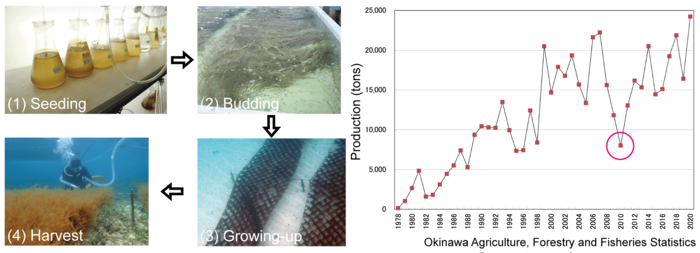A simple PCR test could be used to improve cultivation of the edible brown seaweed, Okinawa mozuku, and even aid attempts at generating heat-tolerant strains, reported scientists from the Okinawa Institute of Science and Technology Graduate University (OIST). The PCR test, described in a new study published June 9, 2022, in Phycological Research, detects nine genes that reveal the mozuku algae’s lifecycle stage, as well as its sex.

Credit: OIST
A simple PCR test could be used to improve cultivation of the edible brown seaweed, Okinawa mozuku, and even aid attempts at generating heat-tolerant strains, reported scientists from the Okinawa Institute of Science and Technology Graduate University (OIST). The PCR test, described in a new study published June 9, 2022, in Phycological Research, detects nine genes that reveal the mozuku algae’s lifecycle stage, as well as its sex.
Okinawa mozuku (Cladosiphon okamuranus) is a much-loved algal superfood in Japan, that farmers have cultivated along the Okinawan seashore since the 1980s. In the autumn, the farmers cultivate mozuku germlings, or ‘seeds’ in tanks, to induce their buds. Then, the farmers transfer them to the ocean on nets to grow until they are harvested in spring. Around 15,000 to 20,000 tons of mozuku are collected each year, contributing more than ¥2 billion yen to the local economy.
However, mozuku farmers currently face three major problems during the cultivation process. Firstly, some of the mozuku ‘seeds’ don’t bud. Secondly, as the mozuku grows in the ocean, it sometimes detaches from the nets and is swept away by current and tides. Finally, the seaweed is particularly susceptible to heat, with rising ocean temperatures stunting their growth.
“In 2010, the yield fell to less than half the level of a typical year, which is thought to be due to an unusually warm winter,” said Dr. Koki Nishitsuji, a staff scientist in OIST’s Marine Genomics Unit, led by Professor Noriyuki Satoh. “As climate change occurs, the frequency of warmer winters could increase, so new heat-resilient strains are needed.”
One of the most effective ways to engineer traits such as heat tolerance is through crossbreeding, which is when individuals from two different strains are bred together to create a new mixed strain. However, scientists have struggled to crossbreed algae due to difficulties with distinguishing male germ cells from female germ cells.
“In other organisms, such as egg and sperm in mammals, there are visible differences,” explained Dr. Nishitsuji. “But for algae, the germlings can’t be identified by eye, only by their DNA.”
Over the last few years, the research team from the Marine Genomics Unit decoded the genome of the four different S-, K-, O- and C-strains of Okinawa mozuku, and the related species, Nemacystus decipiens, known as ito-mozuku in Japanese.
Now, by making use of this wealth of genomic information, the team were able to identify 9 key, sex-determining genes.
When the scientists ran PCR tests on the mozuku germlings, five of these genes were only detected in males, while the other four were only found in females.
“Now that we can identify the sex, we’ve begun crossbreeding the O-strain with both the S-strain and the K-strain, to see if this results in a more heat-tolerant strain, said Dr. Nishitsuji. “We are also working on identifying genes that can act as markers for the different strains, so that we can fully confirm that the crosses were successful.”
As well as introducing heat resistance into newly developed strains, crossbreeding can also help the researchers address the issue of mozuku gettng swept out to sea, by developing strains of mozuku that attach more firmly to the nets.
Although primarily developed to aid crossbreeding, the PCR test can also be used by mozuku farmers during the ‘seeding’ stage of cultivation, by allowing them to identify what lifecycle stage the germlings are in.
The lifecycle of mozuku is complicated and unique, compared to animals and land plants. Humans (and most other animals) are diploid, which means that our body cells contain two sets of DNA – one set from our mother, and another set from our father. Our germ cells (eggs and sperm) are haploid, which means they have just one set of DNA. At fertilization, the haploid egg and sperm combine to form a diploid embryo.
However, in mozuku, germlings occur at two different stages of the lifecycle, as haploids and diploids. But only the diploid germlings bud and develop into the edible mature mozuku that the farmers want to cultivate. If the tank is contaminated with haploid germlings, then less budding occurs, with lower yields of mozuku ultimately harvested.
“Diploid germlings look the same as the male and female haploid germlings, so it’s a common way for farmers to lose yield,” said Dr. Nishitsuji. “But now, our PCR test can be used early on to check whether they are diploid, as these germlings will contain all 9 male and female genes.”
In the autumn, the team will collaborate with the Okinawa Prefectural Fisheries and Marine Technology Center in Itoman, and Onna Fisheries Cooperative, using the PCR tests to try and improve their final yield.
Importantly, the sex-determining marker genes identified in this study are likely to be similar for other brown algae, like Undaria pinnatifida (Wakame in Japanese) and Saccharina japonica (Kombu), which are also economically important crops.
Dr. Koki Nishitsuji is the recipient of the 2019 Okinawa Research Incentive Award for his contribution to Okinawa Prefecture by deciphering algae genomes. This research was funded by the Urakami Food and Food Culture Promotion Foundation.
Journal
Phycological Research
DOI
10.1111/PRE.12489
Method of Research
Experimental study
Subject of Research
Not applicable
Article Title
Development of DNA markers that distinguish male and female haploid germlings of the brown alga, Cladosiphon okamuranus
Article Publication Date
9-Jun-2022




